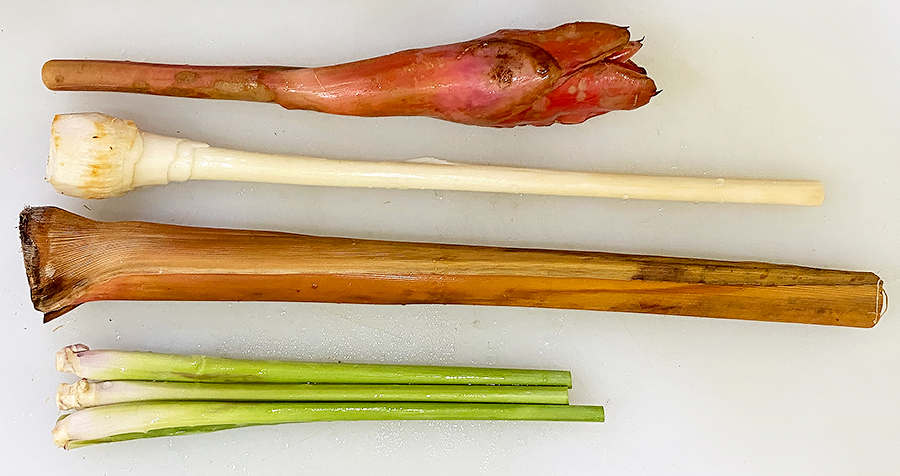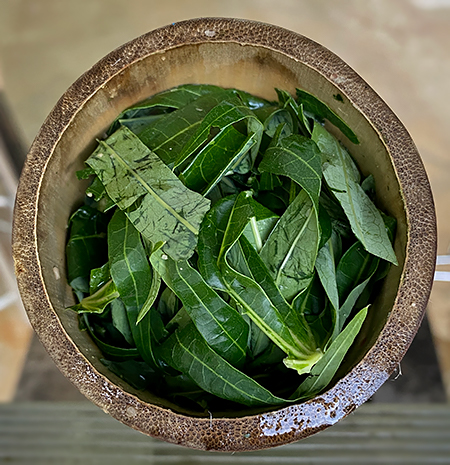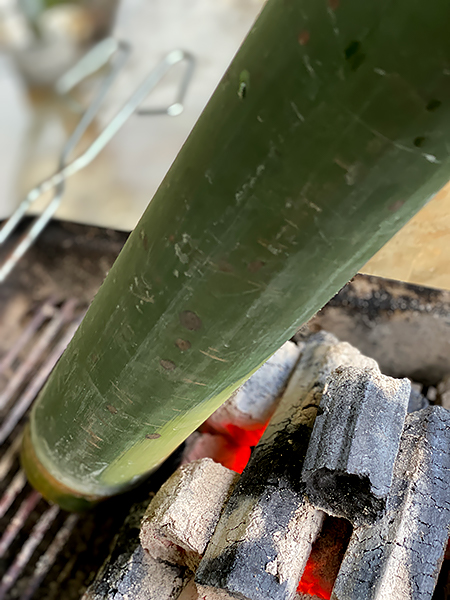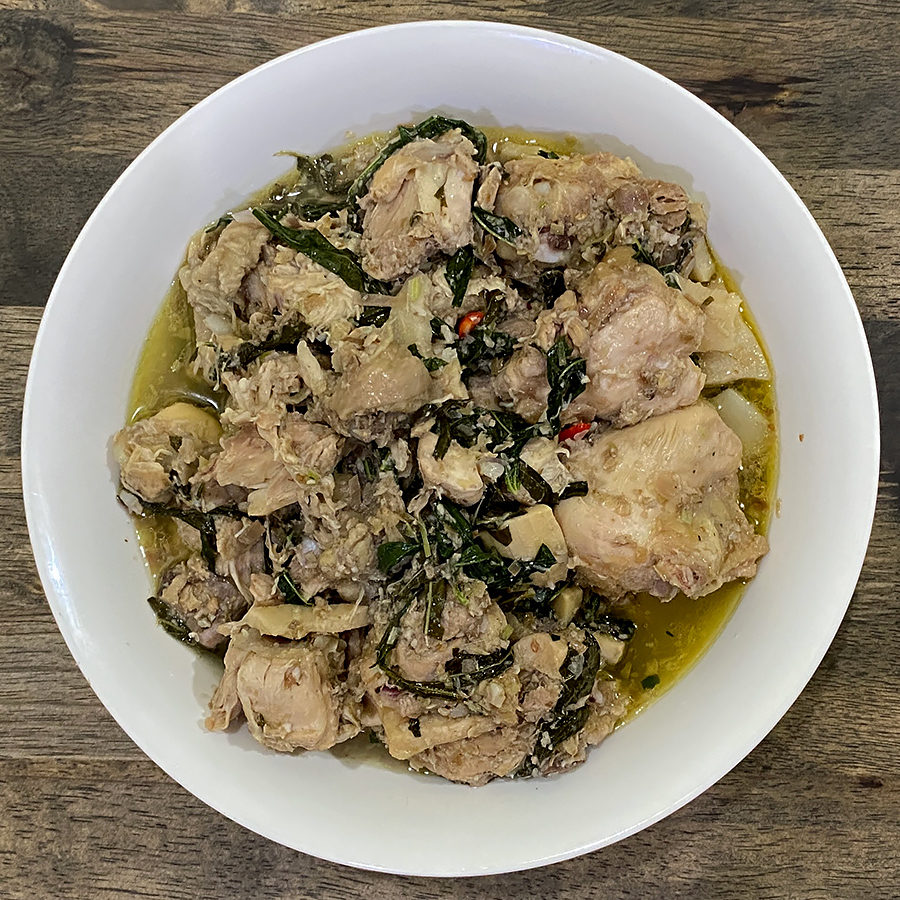|
Clem's
Manuk Pansuh (Bamboo Chicken) |
Manuk
Pansuh is a dish of the Bidayuh and Iban (previously known
collectively as Dayaks) in the western parts of Borneo.
For this dish, a variety of flavoring ingredients are added
to chicken which is then slowly cooked inside a bamboo log over a
fire. Manuk Pansur is de rigueur for the Bidayuh
and Iban harvest festival (Gawai Dayak). "Gentrified"
(read that as having no time for tradition) folk use pots and
pans to cook this dish. But, half the fun of this dish is the
indeterminate cooking in a bamboo log.
Here are the ingredients
which I used
to make a batch:
-
One chicken
Ingredients to pound or blend:
-
2 X stalks
Bunga Kantan (ginger flower; Torch Ginger; Red Ginger Lily;
Torch Lily).
-
2 X stalks
lemongrass.
-
OPTIONAL: 2 X
stalks tepus (Etlingera punicea (Roxb.) R.M. Smith)
.
(Wild Ginger - the same Zingiberaceae Family as the
Common Root Ginger).
Like batteries, these are cleverly sold in bunches of three
when you only need one or two.
Remove the fibrous sheath. Use only the whitish pith in the
core.
-
1 inch ginger.
-
5 cloves
garlic.
-
5 X red onions
(bawang merah).
-
OPTIONAL:
Chillis to taste.
The rest:
-
Some daun
bungkang (Syzygium polyanthum), or substitute with Bay leaves (3 - 4 pieces).
-
Salt to
taste.
-
Chicken stock
to taste.
-
Water to just
cover the chicken.
-
1 X bamboo log
long enough to hold chicken with enough excess length
for a leaves stopper, and boiling/bubbling of the cooking
chicken.
If you buy the log before it is used, you can prolong its
freshness by putting some water inside the log. This will
keep the bamboo moist.
-
Tapioca
leaves:
Remove leaves from their stalks.
OPTIONAL: Take a handful of leaves and wring with your hands
to bruise the leaves, and then mix them with the chicken.
Use another handful as a stopper for the bamboo log opening
(or your could use banana leaves).
REMEMBER! The tapioca plant contains cyanogenic glucosides (linamarin
and lotaustralin). Upon hydrolysis, these compounds release
hydrogen cyanide which is toxic. Therefore, tapioca parts
which are eaten need to be sufficiently cooked to destroy
the possible release of toxic compounds.
-
OPTIONAL:
Bamboo shoots thinly sliced (I added this as it seemed
logical for a dish cooked in a bamboo log. However, I do not
see this item in most traditional recipes). The shoots also
serve to increase the veg component of this dish.
|
|

From top to bottom:
Torch ginger
Tepus core (pith)
Tepus intact (with fibrous, hard sheath)
Lemongrass (for scale)
Method
-
Cut the
chicken into bite-sized pieces.
-
Mix the
blended ingredients with the chicken.
-
Add the rest
of the ingredients.
-
Load chicken
into the bamboo log.
-
Add sufficient
water to just cover the chicken.
-
Stopper the
opening of the bamboo log with tapioca or banana leaves.
-
Place log over
a mature, steady fire and leave for around 60 minutes
(depends of fire and size of log/contents)
or until sufficiently cooked.
Cooking tip: The bamboo log heats up from the base (it is
nearest to the fire) - when the highest part of the log with
chicken inside is too hot to touch, the dish should be
cooked and ready to dish out.
-
Monitor the
cooking regularly to ensure that the chicken does not run
dry, the fire go out, or the bamboo log catch fire!
-
If all the
bamboo business proves too difficult, you can go modern:
Wrap the chicken mix in aluminium foil, or place it in a
covered ceramic bowl and bake in the oven for a sufficient
time.
Here is the batch
being cooked:
|

Tapioca leaves
stoppering the bamboo log |

The bamboo log
with enough tilt to receive heat from the charcoal fire below |
|
As served:

Observation and conclusion
It might be helpful to the cooking process if the chicken is not
packed tightly into the bamboo. If there is some space between
the chicken pieces, water as it boils, and steam, will be able to rise
freely upwards from the base of the bamboo log where the heat is
applied, to more quickly cook the chicken which is further away from the
heat source.
This is by no
means a spicy dish - it is a rather mild dish in comparison to
say those in Malay cuisine. Appreciation of this dish lies in the multi-flavors
imparted by the various herbaceous ingredients, each of which
are complex in themselves.
|
08 June 2021
Created by Clem Kuek
|



